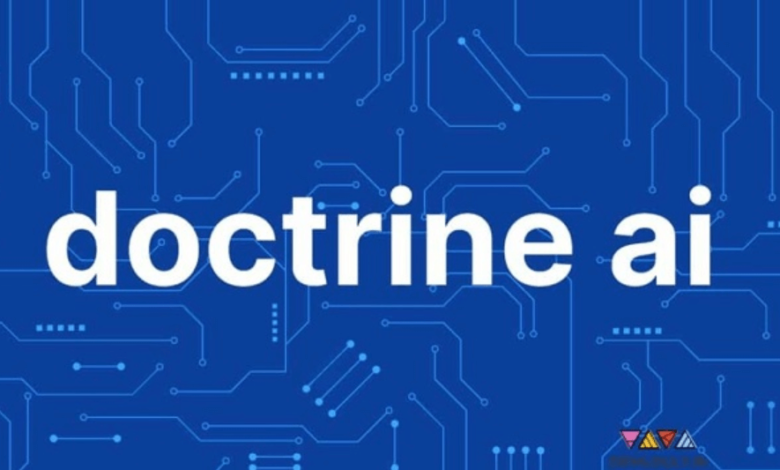Everything You Need To Know About Doctrine AI

In the rapidly evolving field of artificial intelligence, a new paradigm is making waves. This comprehensive guide explores the ins and outs of it, from its foundational principles to its potential to reshape industries and societal norms. With an emphasis on ethical considerations and real-world applications, we delve into how Doctrine AI stands out in the tech world, offering insights for enthusiasts, professionals, and the curious alike.
Introduction to Doctrine AI
- What is Doctrine AI?
It represents a groundbreaking approach in the realm of artificial intelligence, where ethical principles and human-centric considerations guide the development and application of AI technologies. Unlike conventional AI systems that prioritize efficiency and accuracy above all, It emphasizes the importance of ethical decision-making, transparency, and accountability in AI deployments.
- The Emergence of Doctrine AI in Technology
The concept of Doctrine AI has emerged as a response to growing concerns about the unbridled advancements in AI and their potential impacts on society. As AI systems become more integral to our daily lives, the need for a doctrine—a set of guiding principles—to ensure these technologies benefit humanity as a whole has never been more critical.
Read also: The Top Virtual DJ Software for Professional DJs
Understanding the Basics of Doctrine AI
- Definition and Core Principles
At its core, It is defined by its commitment to ethical guidelines, human welfare, and the responsible use of technology. It operates on the premise that AI should augment human abilities without compromising moral values or causing harm to individuals or communities.
- How Doctrine AI Differs from Traditional AI Systems
Unlike traditional AI, which often operates in a black box with little regard for the societal implications of its decisions, It advocates for transparency, explicability, and ethical accountability. This distinction underscores a shift towards more responsible and sustainable AI development practices.
The Philosophy Behind Doctrine AI
- Ethical Considerations and Philosophical Underpinnings
Doctrine AI is deeply rooted in ethical philosophy, drawing from centuries-old debates about morality, justice, and human rights to inform its principles. It challenges developers and stakeholders to consider the broader implications of AI technologies on human dignity and societal well-being.
- The Role of Human Judgment in Doctrine AI
A key tenet of Doctrine AI is the irreplaceable value of human judgment. While AI can process information and make predictions at unprecedented speeds, It recognizes that human oversight is crucial in interpreting and acting upon AI-generated insights, especially in complex ethical landscapes.
Applications of Doctrine AI
- Industry-Specific Applications: Healthcare, Finance, and More
It finds its application across various sectors, each benefiting from its ethical framework. In healthcare, it could ensure patient data privacy while enhancing diagnostic accuracy. In finance, It could help in making transparent investment decisions that consider ethical implications, such as environmental impact and social responsibility.
- Enhancing Decision-Making with Doctrine AI
By incorporating ethical considerations into decision-making processes, It enhances the quality and integrity of decisions made in both public and private sectors. It ensures that automated systems consider the welfare of all stakeholders, leading to more equitable and just outcomes.
Doctrine AI and Machine Learning Integration
- Combining Doctrine AI with Machine Learning Techniques
Integrating Doctrine AI with machine learning opens new avenues for creating AI systems that not only learn from data but also adhere to ethical guidelines. This integration promises to make AI solutions more responsive to human needs and societal values.
- Case Studies: Success Stories and Challenges
Exploring real-world case studies highlights the potential of Doctrine AI to drive positive change while also acknowledging the challenges in aligning AI development with ethical standards. Success stories in sectors like healthcare, where It has improved patient outcomes through ethical data use, contrast with the challenges in ensuring fairness and avoiding bias in AI models.
The Impact of Doctrine AI on Society
- Economic Implications and Workforce Transformation
The adoption of Doctrine AI has significant implications for the economy and the workforce. By prioritizing ethical considerations, it may lead to the creation of new job categories focused on oversight and ethical compliance in AI deployments, transforming the landscape of work in the digital age.
- Ethical and Societal Considerations of Implementing Doctrine AI
The widespread implementation of necessitates a reevaluation of societal norms and legal frameworks to ensure that technology serves the public good. It prompts a critical discussion about the role of AI in our lives and how we can harness its potential responsibly.
Doctrine AI in the Future of Technology
- Predictions and Future Trends
As we look to the future, It is set to play a pivotal role in shaping the trajectory of technological advancement. Its emphasis on ethical AI could lead to more sustainable, equitable, and humane tech ecosystems, influencing everything from governance models to individual behaviors.
- The Potential for Shape New Industries
The principles of it have the potential to give rise to new industries and services that prioritize ethical considerations in their offerings. This could include consultancy firms specializing in ethical AI, compliance software, and educational programs focused on responsible AI development.
Challenges and Criticisms of Doctrine AI
- Addressing Bias and Fairness in AI Systems
One of the most significant challenges facing is the issue of bias and fairness. Ensuring that AI systems do not perpetuate or exacerbate existing inequalities requires constant vigilance and a commitment to ethical principles throughout the AI development lifecycle.
- The Complexity of Doctrine AI Implementations
Implementing principles in real-world applications is a complex endeavor that involves balancing technological capabilities with ethical considerations. It requires a multidisciplinary approach, bringing together experts from tech, ethics, law, and social sciences to navigate the challenges.
Comparative Analysis
- Doctrine AI vs. Conventional AI Models: A Comparative Overview
Comparing with conventional AI models highlights the stark differences in their approaches to technology development and deployment. This analysis underscores the need for a paradigm shift towards more ethical and responsible AI practices.
- Evaluating the Effectiveness of Doctrine AI Solutions
The effectiveness of it solutions is measured not only by their technical performance but also by their impact on society. Evaluating these solutions requires a holistic approach that considers ethical outcomes alongside traditional metrics of success.
Developing Doctrine AI Solutions
- Best Practices in Developing and Deploying Doctrine AI Systems
Developing and deploying systems involves adhering to best practices that prioritize ethical considerations, such as conducting impact assessments, engaging with diverse stakeholders, and maintaining transparency in AI operations.
- Tools and Technologies for Building Doctrine AI Applications
A variety of tools and technologies are available to support the development of applications. These include ethical AI frameworks, transparency tools, and platforms that facilitate stakeholder engagement in the AI development process.
Doctrine AI and Data Privacy
- Balancing Innovation with User Privacy
A critical aspect of is its commitment to safeguarding user privacy. This involves designing AI systems that respect data protection laws and ethical guidelines, ensuring that personal information is handled responsibly.
- Regulations and Compliance in the Age
The rise of brings with it a need for updated regulations and compliance mechanisms that address the unique challenges posed by ethical AI. This includes creating standards for transparency, accountability, and ethical decision-making in AI deployments.
Expert Insights
- Interviews with AI Researchers and Industry Experts
To gain deeper insights into the implications and potential of it, we turn to interviews with leading AI researchers and industry experts. Their perspectives shed light on the current state of ethical AI and the road ahead.
- The Future of AI Research: Opportunities and Challenges
The future of AI research is closely intertwined with the development of it. Exploring the opportunities and challenges in this field reveals the potential for significant advancements in ethical AI, as well as the hurdles that must be overcome.
Read also: How to check your demat account balance?
Conclusion
It represents a critical evolution in the field of artificial intelligence, one that places ethical considerations at the forefront of technological development. As we navigate the complexities of integrating AI into every facet of our lives, the principles of Doctrine AI offer a roadmap for creating technologies that enhance human welfare, uphold ethical standards, and foster a more equitable society. The journey towards fully realizing the potential of Doctrine AI is fraught with challenges, yet it is a necessary step in ensuring that our technological future is aligned with our highest moral values.
Frequently Asked Questions
How does Doctrine AI differ from traditional AI?
It is distinct from traditional AI in its foundational approach, prioritizing ethical considerations, transparency, and accountability. While traditional AI focuses on efficiency and problem-solving, Doctrine AI integrates ethical principles to ensure technology serves humanity’s best interests, emphasizing the impact of AI decisions on society and individual lives.
What are the main ethical considerations?
The main ethical considerations in Doctrine AI revolve around fairness, privacy, transparency, and accountability. It addresses the moral implications of AI decisions, seeks to prevent bias and discrimination, ensures data protection and privacy, promotes clear understanding and explicability of AI processes, and holds developers and users accountable for the AI’s impact.
Can help in reducing bias in AI systems?
Yes, It can significantly contribute to reducing bias in AI systems. By incorporating ethical guidelines and diverse datasets from the outset, and through continuous monitoring and adjustment, It aims to identify and mitigate biases, ensuring fairer outcomes and more equitable treatment across different groups.
What industries could benefit most from Doctrine AI?
Numerous industries stand to benefit from it, including healthcare, finance, education, criminal justice, and human resources. Any sector where AI decisions have significant ethical implications or where fairness and transparency are paramount can leverage to enhance outcomes and trust in AI applications.
How can companies start implementing principles?
Companies can start implementing principles by first establishing a clear ethical framework for AI development and use. This includes training teams on ethical AI practices, engaging with diverse stakeholders to understand potential impacts, integrating ethics into the AI development lifecycle, and setting up governance structures to oversee AI projects.
What are the future trends in research?
Future trends in research may include the development of more sophisticated ethical frameworks, enhanced methods for bias detection and correction, greater emphasis on human-AI collaboration, and the exploration of new applications in emerging fields. Additionally, there will likely be a focus on creating global standards and regulations to guide ethical AI development and use.






